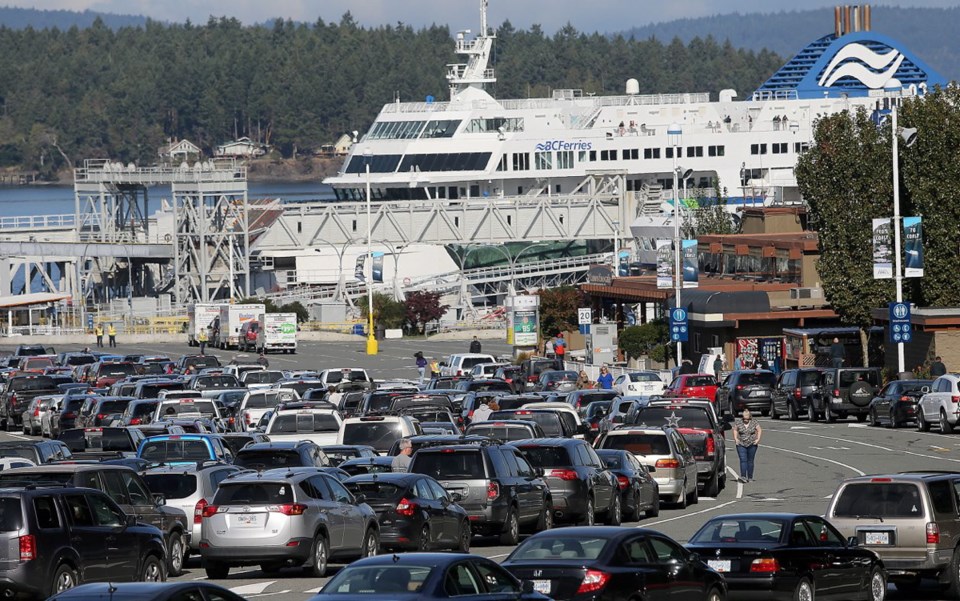Here’s something to ponder while lined up at Swartz Bay or Nanaimo this long weekend: Reservation fees could go the way of the Sunshine Breakfast on B.C. Ferries’ major routes.
No specifics yet, but the corporation is working on a model that would eliminate the extra charges on the three main Vancouver Island-Lower Mainland runs.
It’s tied to information technology and e-commerce initiatives that would, according to B.C. Ferries’ annual report, see the fees worked into “variable-priced fare products” — or, more simply, the use of discounts to even out loads, enticing passengers from busy sailings to less-popular ones.
The corporation has already tried that strategy on a limited basis. It expects, within a week or two, to announce details of a summer program similar to 2017’s Sunrise and Sunset Savings, which cut fares on lesser-used sailings.
There’s no timeline for cutting reservation fees, though. The new plan is a work in progress. “We recognize that some customers don’t want to be tied into a reservation as their plans may change,” B.C. Ferries’ Deborah Marshall said on Tuesday. “Other customers are willing to change their travel plans if a discount were available. We are working to address these scenarios with the model we are working on.”
If B.C. Ferries does dispense with reservation fees, it will eliminate the grumbling heard by some — OK, me — since the extra charges were introduced in 1997. The idea of having to choose between forking out an extra $15 or rolling the dice on a two-sailing wait has had the more, ah, budget-conscious among us grousing about the inequities of a system that lets the well-heeled (or wheeled) buy their way to the front of the queue. (“Two-tiered health care? We’ve got two-tiered ferries,” I fumed to the woman in the ticket booth. “Actually,” she replied, “they’re seven-tiered, if you count the engine deck and bridge.”)
This becomes a bigger deal now that ridership is rebounding. B.C. Ferries carried its largest number of passengers since 2008 last year, and more vehicles than any year since 2010. That’s great for the bottom line, but means more competition for space on board.
The good news, for those who break down and open their wallets, is that lower fees were part of a suite of consumer-friendly changes announced in April. Reservation charges were dropped to $10 from $15 for customers who book seven days in advance. It’s $17 after that, and $21 on the day of travel. The changes are expected to cut into the $18 million a year the fees earn for the corporation, which had total revenue of $859 million in 2017.
That still puts B.C. Ferries out of step with similar services, though. Few — the Coho ferry between Victoria and Port Angeles is an exception — charge a separate reservation fee. They do, however, penalize those who reserve, but don’t show up.
• Washington State Ferries lets you make a reservation for free, and lets you cancel that reservation without penalty if you do so up to 5 p.m. the day before you were scheduled to travel — but if you cancel after that or don’t show up on the day, you face a no-show fee based on the route and the size of the vehicle.
• Reservations on the Alaska Marine Highway ferries are mandatory but free. However, there’s a cancellation penalty that ranges from five per cent to 40 per cent of the fare, climbing as you near the time of travel. If you don’t show up, you eat the 40 per cent.
• The Newfoundland-Nova Scotia ferry doesn’t charge an extra reservation fee, but there’s a $25 fee if you cancel or change your reservation within 48 hours of departure.
• Likewise, there are no reservation fees for other Atlantic Canada ferries, but you’ll get dinged with penalties if you don’t show up: $25 on the Digby, Nova Scotia-Saint John, New Brunswick route, $100 on the Nova Scotia-Maine run and the full fare on the P.E.I.-Nova Scotia crossing.



